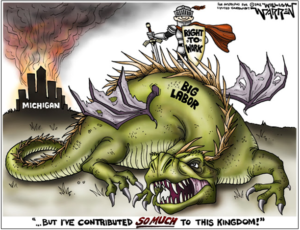A recent federal court decision has got big labor running scared. And it should be.
The Sixth Circuit Court of Appeals has upheld a Michigan law that bars public schools from collecting union dues, overturning a district court injunction against implementation of the law. The circuit court also ordered the lowered court to uphold the law.
The law in question requires that public sector unions collect their own dues from public school teachers, rather than the school’s payroll system handling it. The unions attempted to argue that not compelling as a matter of law teachers to pay up somehow violated the labor organization’s First Amendment Rights.
The Sixth Circuit responded: “The problem with this theory is that the Supreme Court has already rejected it,” citing the 2009 Ysursa v. Pocatello Education Association ruling that stated “The First Amendment prohibits government from ‘abridging the freedom of speech’; it does not confer an affirmative right to use government payroll mechanisms for the purpose of obtaining funds for expression.”
The Sixth Circuit applied Ysursa, saying, “Public Act 53 does not restrict the unions’ speech at all: they remain free to speak about whatever they wish,” noting that nothing in the First Amendment mandates that public sector payroll deductions be given to unions.
The case clarifies the little known mechanism of mandatory dues collection that public sector unions typically have heretofore enjoyed in non-right to work states.
Now that Michigan is right to work, this offends big labor’s ability to raise money in two distinct ways. First, if workers are not compelled to join a union, they cannot furnish union dues. And if the public school payroll systems do not automatically collect union dues, there is no guarantee the teachers will hand them over, either.
These reasons alone would explain the unions’ desperation to overturn the Michigan law.
But there’s an even larger reason, as this could signal a sea change in big labor’s ability to finance Democratic Party operations, particularly in states with large public sector union presences.
Attacking compulsory collection of union dues in the public sector threatens big labor’s political power, not its free speech rights. It also levels a political playing field that once favored candidates backed by the unions. Michigan was once a Democrat stronghold with heavy union support, but has since fallen in Republican hands on a statewide basis.
That is not to suggest that Michigan’s new law is without merit. To the contrary, bloated state budgets include large defined benefit pension and health care liabilities that were won legislatively long ago largely through big labor’s political influence.
It is hardly any wonder electorates and taxpayers across the country are taking a closer look at public sector unions. When so many are struggling in the private sector, why should public sector workers be so well off?
Compulsory union dues in the public sector were just another way for government to secure its hold on power and taxpayer money. And it eventually caused resentment in the electorate, giving Governor Rick Snyder a mandate to do away with the practice.
That is why if these trends against public sector labor organizations are left unchallenged, big labor could be politically threatened in states like California, New York, and New Jersey once thought to be untouchable. And that is what has got big labor scared most of all.
Nathan Mehrens is the President of Americans for Limited Government.







